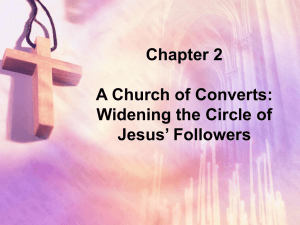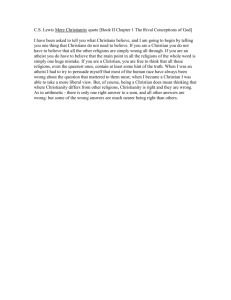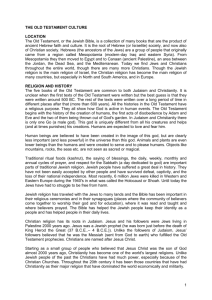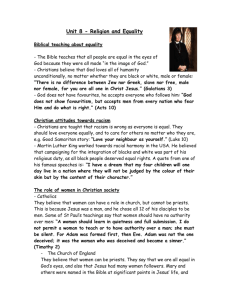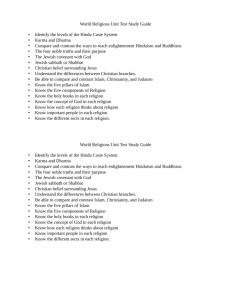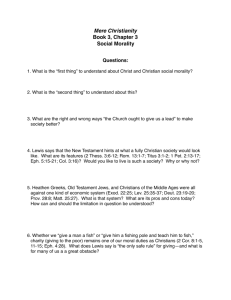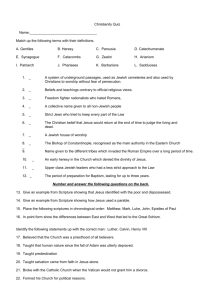Emilia DeMarco Period 5 November 12th, 2014 Essay Comparing
advertisement
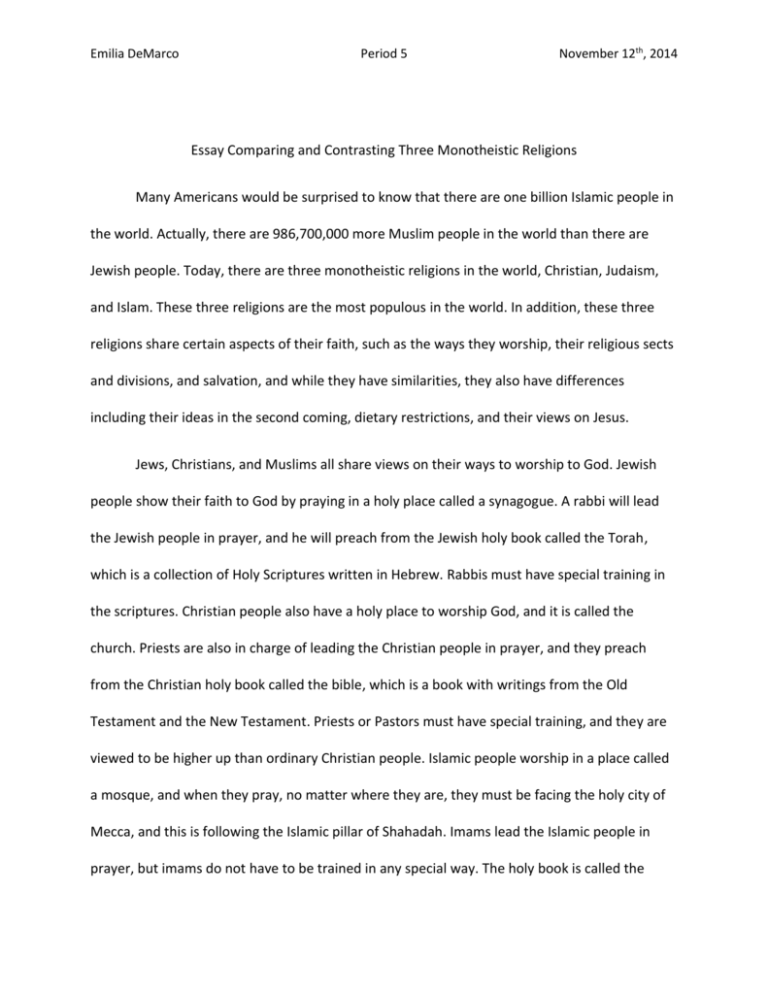
Emilia DeMarco Period 5 November 12th, 2014 Essay Comparing and Contrasting Three Monotheistic Religions Many Americans would be surprised to know that there are one billion Islamic people in the world. Actually, there are 986,700,000 more Muslim people in the world than there are Jewish people. Today, there are three monotheistic religions in the world, Christian, Judaism, and Islam. These three religions are the most populous in the world. In addition, these three religions share certain aspects of their faith, such as the ways they worship, their religious sects and divisions, and salvation, and while they have similarities, they also have differences including their ideas in the second coming, dietary restrictions, and their views on Jesus. Jews, Christians, and Muslims all share views on their ways to worship to God. Jewish people show their faith to God by praying in a holy place called a synagogue. A rabbi will lead the Jewish people in prayer, and he will preach from the Jewish holy book called the Torah, which is a collection of Holy Scriptures written in Hebrew. Rabbis must have special training in the scriptures. Christian people also have a holy place to worship God, and it is called the church. Priests are also in charge of leading the Christian people in prayer, and they preach from the Christian holy book called the bible, which is a book with writings from the Old Testament and the New Testament. Priests or Pastors must have special training, and they are viewed to be higher up than ordinary Christian people. Islamic people worship in a place called a mosque, and when they pray, no matter where they are, they must be facing the holy city of Mecca, and this is following the Islamic pillar of Shahadah. Imams lead the Islamic people in prayer, but imams do not have to be trained in any special way. The holy book is called the Emilia DeMarco Period 5 November 12th, 2014 Koran, and the Koran is said to be the exact words from God. “In Judaism, leaders are called Rabbis, and they receive rigorous training in the scriptures and other Judaic writing. In Christianity, priests or pastors serve as part of a church hierarchy, or ranks of authorities. Only trained, ordained, or initiated priests can fulfill sacred functions of worship for the lay, or ordinary people. In Islam, there is no priesthood, ordination, or religious hierarchy. A prayer leader is called an imam- ‘one who stands in front’ of the lines of worshippers” (Abrahamic Faith Reading Notes.) This shows that all three monotheistic faiths have different names for their leaders, and these leaders have different statuses in a religion, and followers worship in a holy place with a holy book. All three religions are divided into different sects and religions, and each division of that religion has different viewpoints inside their faith. Jewish people have four different sects in their religion, Orthodox, Reform, Conservative, and Reconstructism Jews. Orthodox Jews live a type of lifestyle demonstrated by the Torah, and this division is most dedicated to their faith. Reform Jews follow religious laws and customs that were set up by the Torah many years ago, like how Conservative Jews are mainly focused on keeping their traditions of the religion. Lastly, Reconstructism Jews are trying to modernize their religion to help in fit into modern day society. In addition, Christians have many different sects in their religion, but some of the main forms are catholic, Presbyterian, protestant, and Roman Catholic. While all of these groups are a part of the Christian faith, Catholics and Protestants have different viewpoints on salvation. Catholics believe that in order to get to an Eternal Heaven, people must believe in God and do good deeds, while Protestants believe that people must only believe in God. Islamic people also divide their religion into different sects. Some of the different Islamic sects include the Sunni, Emilia DeMarco Period 5 November 12th, 2014 Shi’ite, Shia, Alawi, Sufi, Wahhabi, Druze, and Ba’hai Islam. The two most common forms are Sunni and Shi’ite. Just like Protestants and Catholics, and Orthodox and Reform Jews, the Sunni and the Shi’ites have different viewpoints on their religion. Shi’ite Muslims believe in a strict form of Islam like Muhammad demonstrated in the Koran, while Sunni Muslims are more like Reconstructism Jews. “For seventeen hundred years religious sects have done nothing but harm” – Voltaire (Voltaire.) This is explaining how religious divisions have caused many controversies throughout time, even though they believe in the same things. The Jews, Christians, and Muslims have all divided their religions into different sects, and some that share different viewpoints. Judaism, Christian, and Islam all believe people must complete certain deeds for their souls to enter into Heaven. For Jewish people they believe that they must complete two things throughout their lifetime. First, people must believe in God, they must respect him, and they must follow the Ten Commandments that they set up for people. Also, they must complete good deeds during their lifetime. Christians also have beliefs in how they must enter Heaven. Some Christian believers think they must complete good deeds during their lifetime. While other Christians believe that they must complete good deeds, some Christians believe that people must complete good deeds, and people must believe in God and respect him. Some Christians (Catholics) also believe in a place called Purgatory, and that is for that people who aren’t good enough to go to Heaven, but they aren’t bad enough to go to Hell. Conversely, Muslims believe that to get into Heaven, people must only believe in one God, and they must complete the five pillars of Islam in their lifetime, which are Shahadah, Salah, Zakat, Saum, and Hajj. A part of salvation is “The promise of God is for eternal life after death in a heavenly Emilia DeMarco Period 5 November 12th, 2014 paradise. Equally, those who do evil will be punished in Hell” (Abrahamic Faith Reading Notes.) This shows that as long as people do well in their life, they will be granted with an eternal paradise, and those who do evil will be stuck with an eternal hell. All three religions believe that the followers must complete certain things during their lives for their soul to be entered into Heaven. While Jews, Christians, Muslims share similarities in their religions, they also differ in many ways. While Muslims and Christians believe that one day there will be a second coming, Jewish people do not believe in that. Two of the three religions, “Muslims, also share the belief with Christians in the second coming of Jesus at the end of time” (Abrahamic Faith Reading Notes.) This shows that while Muslim and Christian people believe that Jesus will come down one day and judge them based upon their actions, Jewish people do not. Jewish people do not believe in the second coming, but they are more focused on living their life to the fullest, and they are not concerned about an afterlife. Christians believe that one day God will come down and judge people based on their actions during their lifetime. From there, God will send the good to Heaven and the bad to Hell. Islam people also believe in the idea of a second coming. They believe that their God, called Allah, will send them to Heaven, or “paradise”, or he will send them to an eternal Hell. Jewish people view an eternal Heaven and an eternal Hell differently than Muslim people and Christian people do. Jewish and Islamic people believe that dietary restrictions will bring them closer to their God, but the Christians do not believe in that. In the Jewish religion, people are not allowed to eat certain foods, such as beef, shellfish, turkey, or pork. Also, during certain Jewish holidays such as Yom Kippur, which is the strictest Jewish holiday in regards to fasting. Jewish people Emilia DeMarco Period 5 November 12th, 2014 must fast for a certain amount of time to rid themselves of sins and bring them closer to God. Christian people do not believe in any dietary restrictions; the only time they give up a certain food is during the season of Lent, and this prepares them for Easter. In the Islamic religion, the followers are restricted from eating pork or drinking alcohol. During the holy month of Ramadan, Muslims are not allowed to eat from sun rise to sun down, and this follows the Islamic pillar of Sawm. “Christians do not follow either the very detailed laws about food of the Jews, nor do they follow the laws in Islam that forbid eating pork and drinking alcohol beverages” (Abrahamic Faith Reading Notes.) Jewish people and Islamic people are very strict on what they consume, while the Christians have not set dietary restrictions. The biggest difference between the three religions is their views on Jesus Christ and his roles in their faith. Jewish people believe that Jesus is only a prophet, and that he is not the Messiah, and they are still waiting for the Messiah to come at a later time. “Jews believe that a messiah is still awaited, and coming at a future time” (Abrahamic Faith Reading Notes.) Jewish people do believe in Jesus, but they have very different views on him. Christian people have the strongest belief in Jesus Christ out of all three religions. Christians believe that Jesus died on the cross to save everyone from sins. They believe that Jesus was resurrected, and he ascended into Heaven with God. “Christians believe that Jesus was the Messiah. They also believe that Jesus was the son of God, who came to redeem human beings from sin or wrongdoing, and that he compensated for all human sins with his suffering and death.” (Abrahamic Faith Reading Notes.) Christians have the strongest view on Jesus out of all three monotheistic faiths. Islamic people believe that Jesus did not die on the cross, but a disciple took his place, and from there he ascended into Heaven. “Muslims also believe that Jesus was the Messiah, but they do not Emilia DeMarco Period 5 November 12th, 2014 believe that he was the son of God, and Muslims also believe that God did not allow him to die at the hands of human beings.” (Abrahamic Faith Reading Notes.) The Islamic people believe in some of the same things the Christians do, but not to the extent that Christian people do. One of the main controversial topics between the three monotheistic faiths is what really happened to Jesus Christ and who he was. Judaism, Islam, and Christian may be different religions, but they do share some similarities in their faith. Certain similarities include the ways they worship, the different sects and divisions, and required means for salvation. The difference between the religions are their ideas on the second coming, dietary restrictions, and their views on Jesus. Even though Judaism, Christian, and Islam differ in many ways, they share some of the same viewpoints. If the 2 billion Christians, 1.3 billion Islam, and 14 million Jews got together, they would realize that they have a lot more in common than they think. "Voltaire." Brainy Quotes. N.p., n.d. Web. 9 Nov. 2014. <http://www.brainyquote.com/quotes/authors/v/voltaire.html>. "Abrahamic Faith Reading Notes." Abrahmaic Faith Reading Notes. N.p., n.d. Web. 21 Oct. 2014.
